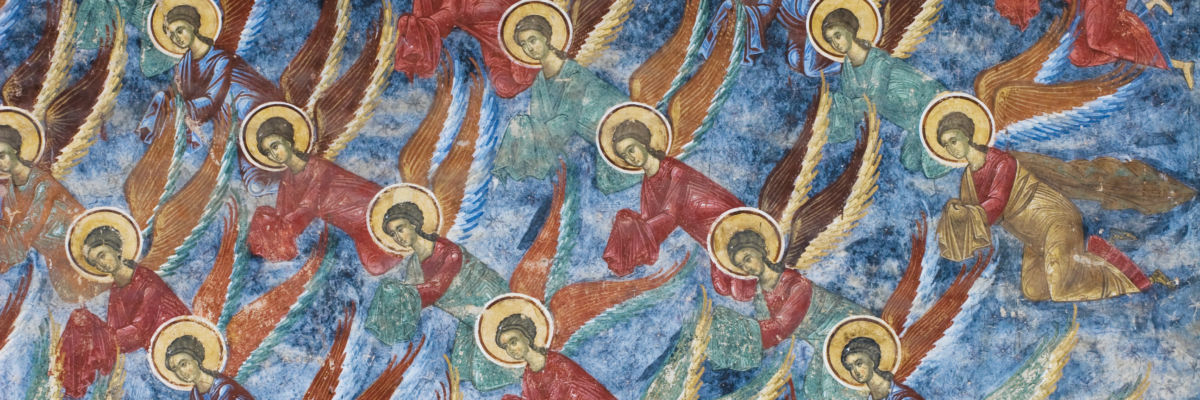
We as Catholics often take great pride in what we believe—rightly so, since it is the truth. But that pride sometimes can be challenged when we dabble a bit in theology, reflecting further upon those beliefs only to discover that some of them seemingly conflict with each other.
Here is an example: Catholics believe that the saints in heaven have wills that are perfectly conformed to God’s will. We also believe that the saints intercede for us, praying to God for help on our behalf. But if the saints’ wills are perfectly conformed to God’s will, then what difference does it make whether they intercede for us? Isn’t there a contradiction here?
St. Thomas Aquinas addresses this apparent incompatibility in the Supplement to his Summa Theologiae (72:3, ad 5). Here’s one way of showing the tension:
P1: The saints conform their wills perfectly to the will of God.
C1: Therefore, the saints will only what they know God to will.
P2: Prayer necessarily involves what someone wills.
C2: Therefore, the saints pray for only what they know God to will.
P3: What God wills can be done without the saints praying for it.
C3: Therefore, the saints’ prayers are not efficacious for obtaining anything.
Aquinas accepts every step of the argument except at the end, where it jumps from premise three to conclusion three. Just because God can bring about some effect without the saints praying for it, that doesn’t automatically mean that the saints’ prayers aren’t efficacious to obtain anything.
His reason is that God could will that the prayers of the saints be the means by which he brings about an effect. In other words, God could will the saints’ prayers to be secondary causes of goodness and of help in our lives.
Aquinas appeals to Augustine as his authority on this point. Referring to the saints, he writes:
Nor is their prayer fruitless, since as Augustine says (De Praed. Sanct. [De Dono Persever. xxii]): “The prayers of the saints profit the predestinate, because it is perhaps pre-ordained that they shall be saved through the prayers of those who intercede for them”: and consequently God also wills that what the saints see him to will shall be fulfilled through their prayers.
To put it simply, God may will that some blessing not be given except through a saint’s intercessory prayer.
Perhaps we can shed further light on this by understanding that God’s providence involves willing not only certain effects to take place, but also the causes from which those effects will be brought about. That is to say, God wills a pattern of cause-effect relationships.
Now, the eternal decree that determines which causes will bring about which effects includes human acts. These actions are an essential part of God’s plan. In the words of Aquinas, they “achieve certain effects according to the order of the divine disposition” (Summa Theologiae, II-II:83:2).
Consider an example. God decreed from all eternity that I would have a fried egg for breakfast this morning. This eternal decree included the egg being produced in a way that involved my wife’s act of love to cook it for me (she’s so sweet), along with all the other ways in which a fried egg comes about: the egg is cracked, put into the frying pan, and cooked by the frying pan through the gas stove. My wife’s help, along with all the other natural processes of cooking an egg, was willed by God to be a part of the cause-effect pattern.
The same is true with intercessory prayer, whether we’re talking about the prayers of Christians on earth or in heaven. Intercessory prayer is simply one human action among many (e.g., my wife cooking the egg) that God wills to be a cause of certain effects in his divine plan.
Intercessory prayer requests from God what he has willed from eternity, to be bestowed by that intercession. As philosopher Brian Davies explains, “God may will from eternity that things should come about as things prayed for by us”—or, for our purposes, the saints.
In other words, it’s possible that God wills some events to occur only as a result of the saints’ intercession. For example, God may have eternally decreed to heal the cancer of a loved one, but only on the condition that persistent requests for a miracle be made through the intercession of a particular saint.
It doesn’t matter whether we know that the effect is conditioned by the request. The point is, it’s possible, so we make the request, hoping God wills the saints’ intercession to be a cause of the effect. If it turns out that he did not will it so, then we trust that God has good reasons for his choice. This is why Christians pray, “Thy will be done.”
But if God wills the saint’s intercession to be the cause of the desired effect, then it would be true to say the saint’s prayer made a real difference. It would have made a difference by being an essential part of the cause-effect pattern God has eternally decreed.
The real causal power that the saints’ prayers have in God’s eternal plan is not at all different from the real causal power my wife’s actions had in producing a fried egg this morning. Her help was essential for the fried egg because that is how God arranged it to be from all eternity. God has created a world in which fried eggs come to be in a specific way.
Similarly, with regard to the saints’ intercession, some events will occur only as a result of their help through intercessory prayer, because that is the specific way God has arranged things. God has created a world in such a way that our actions, including prayer, serve as real game-changers in the history of the world.
The bottom line is this: there is nothing in the saints’ conformity to the divine will that makes it incompatible with the saints’ intercessory prayer being an effective help in our lives. Their petitions are arranged by God to be part and parcel of his divine plan—a great honor God bestows upon them as real causes of good for others. And that’s a belief that we can rejoice in!



